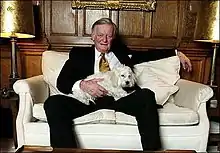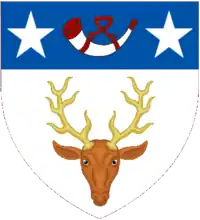Kenneth Thomson, 2nd Baron Thomson of Fleet
Kenneth Roy Thomson, 2nd Baron Thomson of Fleet (September 1, 1923 – June 12, 2006), known in Canada as Ken Thomson, was a Canadian/British businessman and art collector. At the time of his death, he was listed by Forbes as the richest person in Canada and the ninth richest person in the world, with a net worth of approximately US $19.6 billion.[2]
The Lord Thomson of Fleet | |
|---|---|
 | |
| Born | September 1, 1923 |
| Died | June 12, 2006 (aged 82) Toronto, Ontario, Canada |
| Alma mater | St. John's College, Cambridge |
| Occupation(s) | Chairman, Woodbridge Co. Ltd.[1] |
| Spouse |
Nora Marilyn Lavis (m. 1956) |
| Children | 3, including David and Peter |
| Parent(s) | Roy Thomson Edna Thomson |
| Website | thomson.com |
Early life and career
Thomson was born on September 1, 1923, in Toronto, Ontario.[3][4] He was the son of Roy Thomson, the founder of the Thomson Corporation.[3][5]
Thomson was first educated at Upper Canada College before going up to St. John's College, Cambridge, where he received a degree in economics and law. During World War II, he served in the Royal Canadian Air Force. Following the war, he completed his education and entered the family business, working as a reporter for the Timmins Daily Press, then for the next five years, first as a salesman, later as general manager, for the Galt Reporter. In 1953, he was appointed head of Thomson Newspapers, and lived in Toronto for thirteen years.
Business owner
His father purchased The Times in September 1966. Thomson moved to London the following year to become vice-chairman, and a year later chairman, of Times Newspapers Ltd. He returned to Toronto three years later, and in 1971 became joint-chairman, with his father, of the Thomson Organization.[3]
Upon his father's death in August 1976, Ken Thomson became chairman of the Thomson Corporation, and succeeded his father as The Lord Thomson of Fleet. Thomson never used his title in Canada, however, and never took up his seat in the House of Lords. In a 1980 interview with Saturday Night magazine, he spoke of honouring a promise to his father: "In London I'm Lord Thomson; in Toronto I'm Ken. I have two sets of Christmas cards and two sets of stationery. You might say I'm having my cake and eating it too."[6]
At the age of fifty-three, Thomson inherited a media empire of over two-hundred newspaper and television holdings, which also continued to reap profits from a subsidiary North Sea oil investment his father had made a few years earlier. He acquired the Hudson's Bay Company in 1979, and purchased The Globe and Mail in Toronto in 1980.[3][7]
In the 1980s and 90s Thomson presided over a number of divestitures, selling The Times to Rupert Murdoch's News Corporation in 1981, the North Sea oil holdings in 1989, and Thomson Travel in 1998.[3] In 2001, The Globe and Mail was combined with BCE's cable and television assets (including CTV and The Sports Network) to form Bell Globemedia, controlled by BCE with Thomson as a minority shareholder. The company then sold all of its community newspapers to become a financial data services giant and one of the world's most powerful information services and academic publishing companies. Today, the company operates primarily in the US from its headquarters in Stamford, Connecticut. In 2002, The Thomson Corporation began trading on the New York Stock Exchange under the symbol, TOC.[8]
According to Forbes magazine in 2005, the Thomson family was the richest in Canada, and Kenneth Thomson was the fifteenth richest person in the world, with a personal net worth of US $17.9 billion.[9] At the time of his death a year later, he had climbed to ninth richest, with assets of $19.6 billion.[10]
Art collector
Throughout the latter half of the 20th century, Thomson distinguished himself as one of North America's leading art collectors. In the 1940s, he began collecting paintings by Cornelius Krieghoff.[3]
In 1977, the famously private Thomson suddenly found his collection had become a top news story—from The Globe and Mail in Toronto, to The Times of London—after he’d quietly invited English art forger Tom Keating to come to his office at the top of Thomson Tower and check if any of his cherished Krieghoffs were fakes. Keating was under investigation by the Art and Antiques squad at Scotland Yard for selling several fake Krieghoffs in the UK, and he claimed to have painted several hundred of them, mostly in the 1950s. Keating denied finding any of his pastiches in Thomson's office, and said it was a marvellous experience to see such a fine collection.[11][12][13][14] In 1989, Thomson opened an eponymous Gallery in downtown Toronto to display some of these pieces.[3]
In November 2002, he announced he would donate in trust around two thousand art works to the Art Gallery of Ontario, including two major acquisitions he had purchased that July: Paul Kane's Scene in the Northwest: Portrait of John Henry Lefroy, at CA$5.1 million, the highest price ever paid for a Canadian painting, and the highlight of his European collection, Peter Paul Rubens' 17th-century masterpiece The Massacre of the Innocents for CA$117 million.[3][15][16][17]
The collection features essential works of over a dozen eminent 19th to mid-20th century Canadian artists, including some three hundred paintings from Tom Thomson and the Group of Seven, a hundred and forty-five wintry habitant scenes by Cornelius Krieghoff, a hundred mostly impressionistic, modern landscapes by luminary David Milne, as well as works by Paul Kane, Paul-Emile Borduas and William Kurelek.[17][18]
The lesser-known European Collection includes an assortment of 17th to 20th century British ship models, a series of Medieval and Baroque ivory carvings, and features the 12th-century Malmesbury châsse, an ornate casket which once held the bones of a Scottish missionary.[17][19][20]
The unprecedented donation of his CA$300 million art collection helped lure Toronto-native starchitect Frank Gehry to design a major expansion and renovation of the AGO, towards which Thomson gave an additional CA$50 million. He also gifted a CA$20 endowment for gallery operations.[19][7][21]
Retirement
In 2002, Thomson stepped down as chairman of Thomson Corporation, installing his elder son, David. He retained his positions as Chairman of The Woodbridge Company, the family's holding company, which owned a controlling share of Thomson Corporation.
In his final years, Thomson lived at 8 Castle Frank Road (gated estate) in the Rosedale area. Thomson loved to walk his Wheaton terrier in the Rosedale area. He died in 2006 at his Toronto office of an apparent heart attack.[4]
Personal life
In 1956, Thomson married Nora Marilyn Lavis (July 27, 1930 – May 23, 2017)[22][23] They had three children: David (born 1957), Lynne, who changed her name to Taylor (born 1959), and Peter (born 1965). Taylor, a one-time actress and film producer, became known for her lawsuit against Christie's auction house, when in 1994 she bought urns supposedly from Louis XV of France that were discovered instead to be 19th century reproductions.[24][25]
Arms
  |
|
References
- Thomson.com. Management. Accessed March 23, 2006.
- "#9 Kenneth Thompson & Family". Forbes. Archived from the original on April 11, 2006.
- "Kenneth Roy Thomson". The Canadian Encyclopedia.
- "Ken Thomson, Canada's richest man, dies". CBC.
- Newman, Peter C (October 14, 1991). "The Private Life of Canada's Richest Man". Maclean's.
- Martin, Sandra (June 12, 2006). "A man of small economies and grand generosities". The Globe and Mail. Toronto: CTVglobemedia. Archived from the original on June 14, 2006. Retrieved May 8, 2008.
- Olive, David (January 5, 2015). "Thomson family's legacy lies in the art world". thestar.com. Retrieved April 11, 2023.
- Carruthers, Rory (archivist). "Company history: Historical highlights from across Thomson Reuters". thomsonreuters.com. Retrieved April 9, 2003.
- "The World's Billionaires: #15 Kenneth Thomson and family". forbes.com. Retrieved April 9, 2023.
- "The Richest People In The World - Forbes World's Billionaires List: #9 Kenneth Thomson & family". forbes.com. Retrieved April 9, 2023.
- Plommer, Leslie (September 18, 1976). "Degas? Renoir? Or did Keating do it?". The Globe and Mail. pp. 1, 31.
- Parker, Robert (February 1, 1977). "Krieghoff paintings 'genuine'". The Times. p. 3.
- Schroeder, Andreas (April 4, 1977). "The magnificent fraud: Tom Keating's life is imitating art". Maclean’s: Canada's Newsmagazine. pp. 1, 36–40.
- Keating, Tom; Norman, Frank; Norman, Geraldine (1977). The Fake's Progress. Hutchinson of London. p. 268. ISBN 0091294207.
- CTV: Thomson family buyer of $117-million painting, July 13, 2002.
- Adams, James (November 20, 2002). "Thomson hands AGO $370-million donation". The Globe and Mail. Retrieved April 9, 2023.
- Holberton, Paul; Art Gallery of Ontario (2009). The Thomson Collection at the Art Gallery of Ontario (Illustrated ed.). London: Paul Holberton Publishing. ISBN 978-1903470862.
- "The Thomson Collection". Art Gallery of Ontario. Retrieved April 9, 2023.
- CBC Arts (June 12, 2006). "Canada loses great Canadian, arts benefactor in Thomson". cbc.ca. Retrieved April 11, 2023.
- Ross, Val (June 20, 2007). "A 'Thomson moment' at the AGO". The Globe and Mail. Retrieved April 11, 2023.
- Gehry Partners (2008). "Project: Art Gallery of Ontario (renovation)". Archello.com. Retrieved April 9, 2023.
- "Beloved matriarch of the Thomson family". The Globe and Mail. June 2, 2017. Retrieved July 3, 2017.
- "Obituary of Nora Marilyn Thomson". humphreymiles.com. May 23, 2017.
- "Canadas rich troubled Thomson family". The Canadian Encyclopedia. Retrieved August 30, 2019.
- Bennett, Will (May 20, 2004). "Judge orders Christie's to pay damages over £2m urns". www.telegraph.co.uk.
- Debrett's Peerage. 2000.